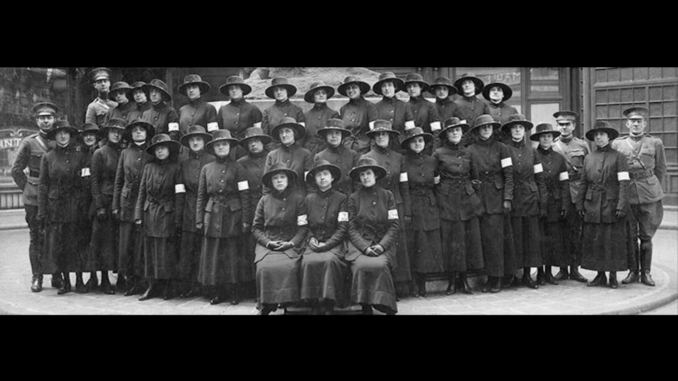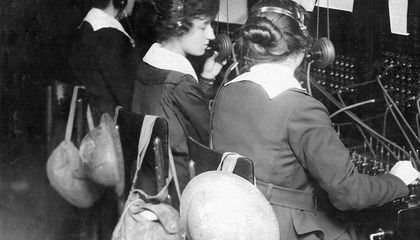
Good communications between military units during a war is essential. When the United States sent the American Expeditionary Forces (AEF) to France in 1917, telephone switchboards and networks went with them. The telephone was the most advanced and reliable form of communications at the time, with four decades of commercial use and development already to its credit. The military phone system connected AEF headquarters to various units and to allies, including the French.
Rotary dial phones had not yet become available; all phone systems still needed switchboards and people to operate them. The US Army put enlisted men to work in this capacity. This was an unpopular decision with the soldiers, as it was widely considered “woman’s work” at that time by men. The decision was even more unpopular with General John “Black Jack” Pershing, commander of the AEF. The men lacked experience, skill, and they were slow, typically taking a full minute to connect a call. A bigger problem was they didn’t speak French: a serious issue when connecting calls to francophone allies and operators.
Pershing was frustrated by the inefficiency of the male switchboard operators compared to the female telephone company operators back home. He demanded the Army enlist experienced – and bilingual – female operators, so-called ‘hello girls‘, immediately. The US Army didn’t like the idea at all, but Pershing pulled alot of weight in the War Department and got his wish.
On the other hand, the decision to accept women into the Army was extraordinarily popular with thousands of women applying for only a few hundred switchboard assignments. Those women chosen for the role took the same oaths of service that enlisted men took and earned the same pay. They were issued Army ‘uniforms’ that looked to be out of style even then.
The first 33 women to complete military training embarked to France in early 1918. Grace Banker, 25-years-old, who had studied French and history in college and had been employed by AT&T as a switchboard instructor, was chosen to lead the new unit. Her title: Chief Operator of Telephone Unit No. 1, U.S. Army Signal Corps.

The women excelled in their new roles. They typically connected a call in 10 seconds, and because they were all fluent in French, they served as translators between anglophones and francophones.
At first the operators only worked the switchboard at General Headquarters (GHQ). Later, a small number were reassigned to positions near the front lines where they had to keep helmets and gas masks ready in the event of artillery shelling or aerial bombardment. The structures and conditions they worked in were rough, and they had to deal with severe weather. Banker kept a diary (against regulations) and despite the danger and hardship found the work near the front exciting.

After the war, the Army transferred the Telephone Units back to the United States, where the women were dismissed from service. They were not given honorable discharges as male soldiers were. In fact, they weren’t discharged at all, they were reclassified as civilian contractors and let go. Fifty-seven years later, after decades of fighting the US Army, the hello girls were finally recognized as veterans in 1977.
Interest in the little known history of these female Army switchboard operators took off a century after their service. An off-Broadway musical, “Hello Girls” was produced in 2018, and a book, “The Hello Girls: America’s First Women Soldiers”, by Elizabeth Cobbs, was published in 2017, with a second printing in 2019. Several interesting-looking videos can be found online using the search terms “the hello girls”, but unfortunately the Owl has not yet had an opportunity to review any of them. With that caveat, here’s a short one for your convenience (4:49):
Question of the Night: Do you prefer a smartphone, a basic no-frills cell phone, or a landline phone? How about an VOIP phone?
